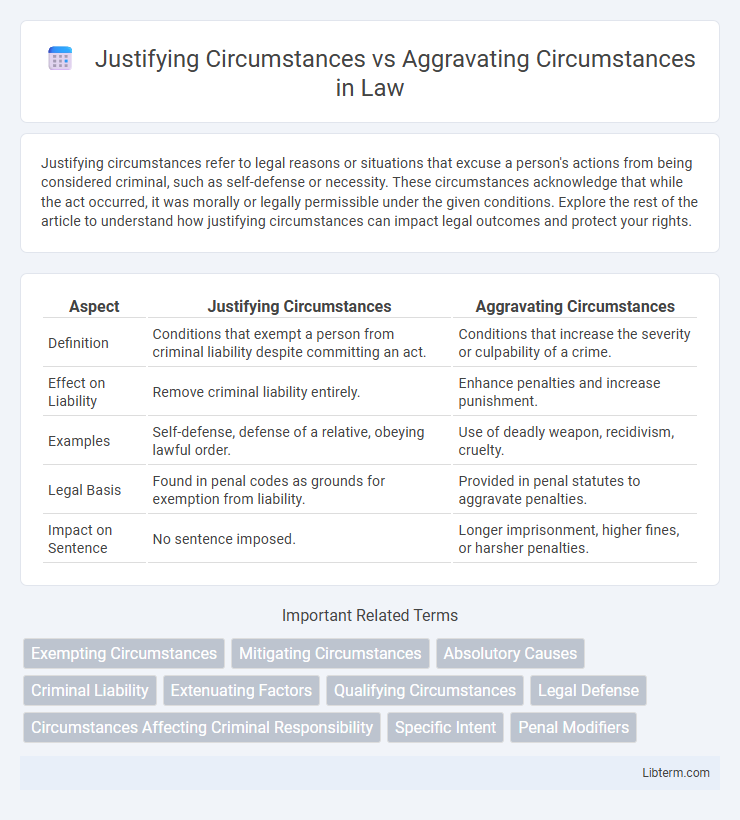Justifying circumstances refer to legal reasons or situations that excuse a person's actions from being considered criminal, such as self-defense or necessity. These circumstances acknowledge that while the act occurred, it was morally or legally permissible under the given conditions. Explore the rest of the article to understand how justifying circumstances can impact legal outcomes and protect your rights.
Table of Comparison
| Aspect | Justifying Circumstances | Aggravating Circumstances |
|---|---|---|
| Definition | Conditions that exempt a person from criminal liability despite committing an act. | Conditions that increase the severity or culpability of a crime. |
| Effect on Liability | Remove criminal liability entirely. | Enhance penalties and increase punishment. |
| Examples | Self-defense, defense of a relative, obeying lawful order. | Use of deadly weapon, recidivism, cruelty. |
| Legal Basis | Found in penal codes as grounds for exemption from liability. | Provided in penal statutes to aggravate penalties. |
| Impact on Sentence | No sentence imposed. | Longer imprisonment, higher fines, or harsher penalties. |
Introduction to Legal Circumstances
Justifying circumstances in legal terms refer to situations where an act typically considered a crime is deemed lawful due to the presence of certain conditions, such as self-defense or necessity, which negate criminal liability. Aggravating circumstances, conversely, are factors that increase the severity or culpability of a criminal offense, such as premeditation, cruelty, or committing a crime against vulnerable victims. Understanding these legal circumstances is crucial for proper case evaluation, sentencing, and the application of justice within judicial proceedings.
Defining Justifying Circumstances
Justifying circumstances refer to specific situations where a person's actions, although typically considered wrong, are deemed lawful due to the context, such as self-defense or state of necessity. These circumstances completely exempt the individual from criminal liability by negating the wrongful nature of the act itself. In contrast, aggravating circumstances increase the severity of a crime, leading to harsher penalties.
Defining Aggravating Circumstances
Aggravating circumstances are factors or conditions that increase the severity or culpability of a criminal act, leading to harsher penalties during sentencing. These circumstances include elements such as premeditation, cruelty, use of a deadly weapon, or committing the crime against vulnerable victims. Unlike justifying circumstances, which exonerate the offender by rendering the act lawful, aggravating circumstances serve to intensify the offender's liability.
Key Differences Between Justifying and Aggravating Circumstances
Justifying circumstances eliminate criminal liability by proving the act was lawful or necessary, such as self-defense or defense of others, while aggravating circumstances increase the severity of a crime by showing factors like cruelty or premeditation. Key differences lie in their legal effects: justifying circumstances result in acquittal, whereas aggravating circumstances lead to harsher penalties or sentencing enhancements. Understanding these distinctions is crucial for accurately assessing criminal responsibility and determining appropriate judicial outcomes.
Examples of Justifying Circumstances
Justifying circumstances refer to conditions where an act, typically deemed criminal, is considered lawful under specific situations like self-defense, defense of a relative, or defense of a stranger, such as using reasonable force to repel an unlawful attack. Examples include a homeowner using force against an intruder to prevent harm or a person restraining a violent aggressor to protect a family member. These circumstances negate criminal liability by proving the act was necessary and legally permissible to prevent greater harm.
Examples of Aggravating Circumstances
Aggravating circumstances increase the severity or culpability of a criminal act, often leading to harsher penalties; examples include committing a crime with premeditation, during the commission of another felony, or involving serious harm to vulnerable victims such as children or the elderly. Other examples consist of using a deadly weapon, exhibiting extreme cruelty, or committing the offense as part of an organized crime. These factors distinguish aggravating circumstances from justifying circumstances, which excuse the act and may exonerate the perpetrator completely.
Impact on Criminal Liability
Justifying circumstances, such as self-defense or necessity, eliminate criminal liability by rendering the act lawful despite the actus reus and mens rea elements, leading to acquittal. Aggravating circumstances, like premeditation or cruelty, increase the severity of punishment by intensifying the defendant's culpability without negating the offense. The presence of justifying circumstances negates criminal liability, whereas aggravating circumstances enhance sentencing within the framework of established guilt.
Judicial Application in Court Cases
Justifying circumstances eliminate criminal liability by proving the defendant's actions were lawful under the law, such as self-defense or necessity, leading courts to acquit the accused. Aggravating circumstances increase culpability by highlighting factors like premeditation or abuse of authority, prompting stricter penalties during sentencing. Judicial application involves thorough examination of evidence and legal standards to distinguish between conditions that exculpate or intensify criminal responsibility in court rulings.
Common Misconceptions and Clarifications
Justifying circumstances eliminate criminal liability by proving the act was lawful under specific conditions, such as self-defense, while aggravating circumstances increase the severity of punishment due to factors like cruelty or premeditation. A common misconception is that justifying circumstances lessen the offense's gravity, but they actually negate guilt altogether, unlike mitigating circumstances which reduce penalties. Clarifying these distinctions ensures accurate legal interpretation and proper application in judicial proceedings.
Conclusion and Legal Implications
Justifying circumstances completely exclude criminal liability by proving the act was lawful, such as self-defense, resulting in acquittal. Aggravating circumstances increase the severity of the offense, leading to harsher penalties under the penal code. The distinction impacts sentencing, with justifying circumstances eliminating punishment, whereas aggravating factors enhance the legal consequences.
Justifying Circumstances Infographic

 libterm.com
libterm.com